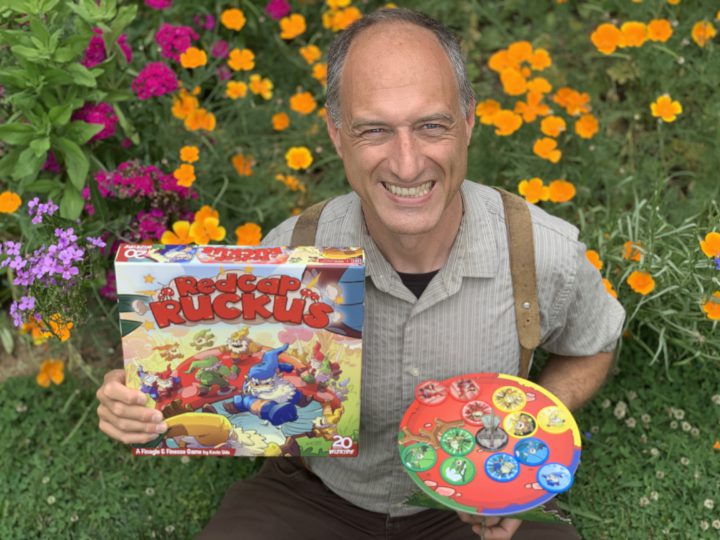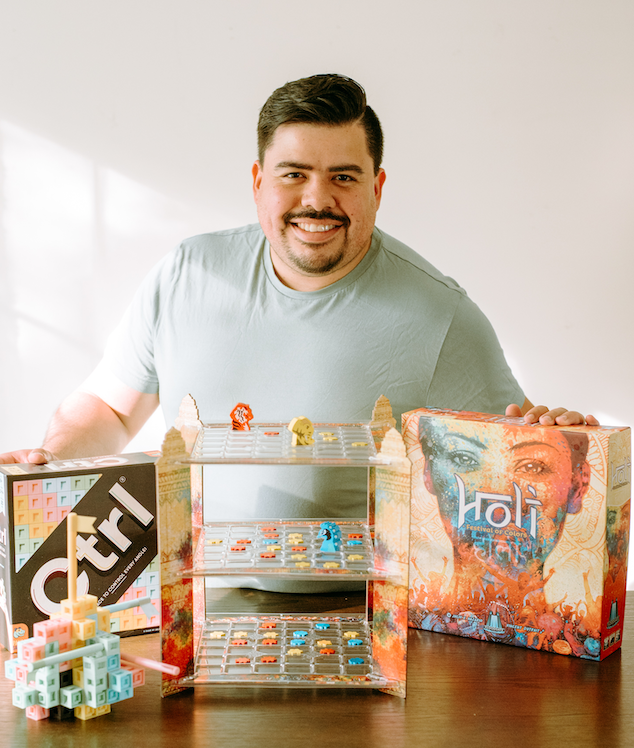Asheville is known for many things — beer, buskers and bears, to name a few. Board game designers, however, aren’t on the radar.
Yet, within the last few years, a group of dedicated gamers has joined forces, creating a local chapter of the Game Designers of North Carolina.
Prior to the pandemic, this party of six regularly met at local venues in town. Now with restrictions easing, the group is eager to reconnect in order to workshop new ideas and play-test one another’s latest prototypes.
Xpress recently spoke with three of the group’s members to learn more about the local chapter and the individual successes they’ve experienced within the board game industry.
Fifty-six and counting
Prior to helping launch the Asheville chapter in 2018, Julio Nazario took frequent trips east to the Piedmont area, where the organization’s main chapter meets. The drive gave him time to brainstorm ideas and make adjustments to his latest creation. Ultimately, though, the distance inspired him to create the local chapter.
“The community is more than fellow designers,” says Nazario, a civil engineer for the U.S. Forest Service. “It is also about getting to know people of different backgrounds with the same creative mindsets.”
In all, Nazario has designed 56 different games, 17 of which he came up with prior to moving to Asheville. Of these designs, two have been published — Ctrl and Holi: Festival of Colors. The former is available at Target and Barnes & Noble; the latter is sold locally at The Wyvern’s Tale, 347 Merrimon Ave.
Despite his recent success, Nazario says he isn’t pursuing game design as a career. Publishing deals vary, he explains. Standard advances range from $250-$5,000, and game designers often get a percentage of the product sales. But the majority of deals, he adds, usually amount to a single print run of 2,000 copies.
“It’s one of those things where I don’t know if I started doing it full time, whether it would still be fun,” he says. “Never say never; but as of now, that is not the plan.”
Long-awaited success
As a fellow founding member of the local chapter, Kevin Ude joined Nazario on many of those tiresome trips east prior to the group’s Asheville formation. Whereas Nazario’s interest in board games came later in life, Ude says he spent much of his youth playing classics such as Clue, Monopoly and chess.
But his favorite game, says Ude, was always the one he hadn’t yet encountered. Much of his childhood, he explains, was spent imagining alternative rules to the available titles he owned.

His curiosity and creativity ultimately led Ude to design his own prototypes. His first published game, Redcap Ruckus, came out in February.
Ude attributes the game’s success to the feedback he received from fellow members of the Game Designers of North Carolina. “They helped a lot throughout every step,” he says. Most importantly, he notes, the group encouraged him to remain open to new design ideas, many of which went into the final product.
Like Nazario, Ude says he isn’t giving up his day job to pursue design full time. For every Monopoly, the two designers note, there are thousands of smaller titles just hoping to find enough buyers to purchase the initial print run.
“Board games are like books,” Nazario explains. “You only know the ones that everybody reads.”
New to the game
Seth McCormick, an art history professor at Western Carolina University, was already flirting with the idea of creating a board game for his students when he learned about the local chapter.
“I started working on one on my own and then found out Julio was trying to start this group, so I hooked up with him and that just brought things to a whole other level once I started play-testing it with other people,” says McCormick.
With the help of Ude, Nazario, and other chapter members, McCormick was able to create Renaissance Rivals, a deck-building game that he compares to Rio Grande Games’ Dominion. Each player assumes the role of a Renaissance artist and must work to obtain commissions and complete masterpieces.
Unlike Redcap Ruckus and Holi, Renaissance Rivals is unpublished, and McCormick says he is not actively seeking a publisher. He enjoys playing it with his students as well as members of Game Designers.
“It’s a really good group,” says McCormick of the local chapter. “It’s small. We were making some gains as far as recruiting new people before COVID, and then that kind of took the wind out of our sails.”
But with summer meetings set to relaunch, McCormick remains optimistic that the chapter will pick up where it left off. “A lot of people get into board games as a way to get a break from screens,” he says. “I know that’s one of the thing I appreciate about it. It’s physical and it’s tactile, and that makes the experience totally different from playing a game on a computer.”




Before you comment
The comments section is here to provide a platform for civil dialogue on the issues we face together as a local community. Xpress is committed to offering this platform for all voices, but when the tone of the discussion gets nasty or strays off topic, we believe many people choose not to participate. Xpress editors are determined to moderate comments to ensure a constructive interchange is maintained. All comments judged not to be in keeping with the spirit of civil discourse will be removed and repeat violators will be banned. See here for our terms of service. Thank you for being part of this effort to promote respectful discussion.